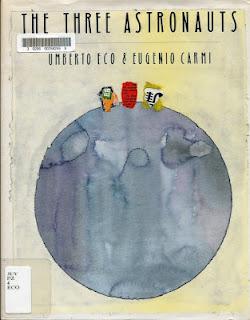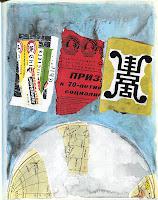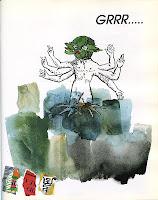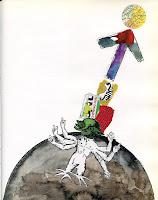 FOR UMBERTO ECO AND EUGENIO CARMI'S FIRST PICTURE BOOK, The Bomb and the General, they tackled the Cold War arms race. For their second, The Three Astronauts, also released in 1966, they turned to the Space Race. It had been only five years since Yuri Gagarin became the first man in space in April of 1961, and the Cold War battle between the USA and the USSR to be the first nation to conquer space was still very present, with both nations setting sights for the moon. Like Eco and Carmi's first book, The Three Astronauts preaches pacifism, but with more of a focus on multiculturalism. It takes the same storybook tone as The Bomb and the General, trying to cast the Space Race in the language of fable.
FOR UMBERTO ECO AND EUGENIO CARMI'S FIRST PICTURE BOOK, The Bomb and the General, they tackled the Cold War arms race. For their second, The Three Astronauts, also released in 1966, they turned to the Space Race. It had been only five years since Yuri Gagarin became the first man in space in April of 1961, and the Cold War battle between the USA and the USSR to be the first nation to conquer space was still very present, with both nations setting sights for the moon. Like Eco and Carmi's first book, The Three Astronauts preaches pacifism, but with more of a focus on multiculturalism. It takes the same storybook tone as The Bomb and the General, trying to cast the Space Race in the language of fable. "ONCE UPON A TIME THERE WAS EARTH.
"ONCE UPON A TIME THERE WAS EARTH."And once upon a time there was Mars."
The people of Earth want to explore Mars. They send up rockets that fall back to the ground. Then they send up rockets that go out into space. Then they send up a dog in a rocket, "but the dogs couldn't talk, and the only message they sent was 'bow wow.'" So they finally send up a man.
 "One fine morning three rockets took off from three different places on Earth," an American, a Russian, and a Chinese. They all want to be the first person to set foot on Mars, and none of them liked one another.
"One fine morning three rockets took off from three different places on Earth," an American, a Russian, and a Chinese. They all want to be the first person to set foot on Mars, and none of them liked one another."Since all three of them were very smart, they landed on Mars at almost the same time." They get out to explore the alien landscape, but "They looked at each other distrustfully. And each kept his distance."
Then in the dead of night, afraid and alone, they each utter their word for "Mommy," which sounds almost the same in each of their languages. So they realize they're all feeling the same thing, and choose to camp together, singing songs and learning about one another.

First thing in the morning, a Martian shows up, and he's so scary looking that all three humans band together, and point their "atomic disintegrators" at him, ready to kill him. He, for his part, finds the humans to be "horrible creatures."
Then a baby bird falls from its nest, and the astronauts and the Martian all pause, and shed a tear for such a heartbreaking sight. The Martian picks up the bird and tries to shelter it, and the humans realize he's feeling the same thing they are, and they go over and shake his hands and all of them decide to return to Earth together.
"And so the visitors realized that on Earth, and on other planets, too, each one has his ways, and it's simply a matter of reaching an understanding."
WHILE THE SUBJECT IN THE THREE ASTRONAUTS feels somewhat dated, its message is not, which is why the Family Opera Initiative is currently developing an opera based on the book. A composer from each of the three countries--America, Russia, and China--is composing music, with words by American poet Nikki Giovanni. (They're looking for donations, so do click through.)
In my post on The Bomb and the General, I went into some depth raising the question, what does Eco's text say about Eco's concept of children's literature, without offering any kind of answer. It's not often that you get an answer from the artist himself, but Eugenio Carmi sat for an interview in conjunction with the opera, which provides insight into the way in which the book was created, and how he and Eco thought about children's literature.
Coming soon: Umberto Eco and Eugenio Carmi's The Gnomes of Gnu.
All images are copyrighted © and owned by their respective holders.

